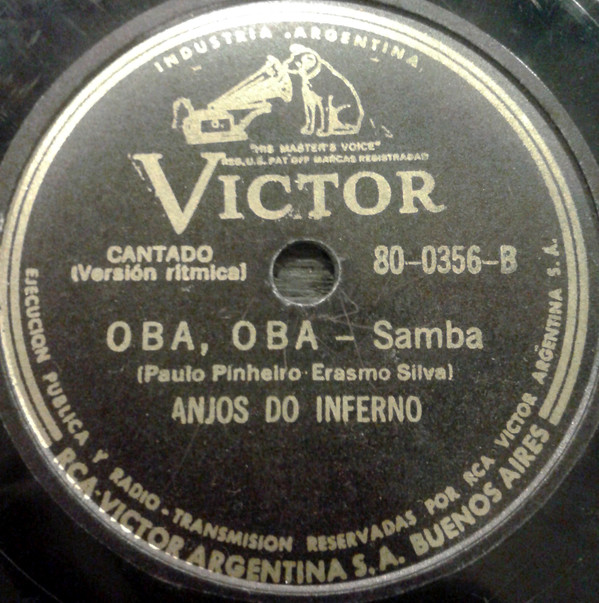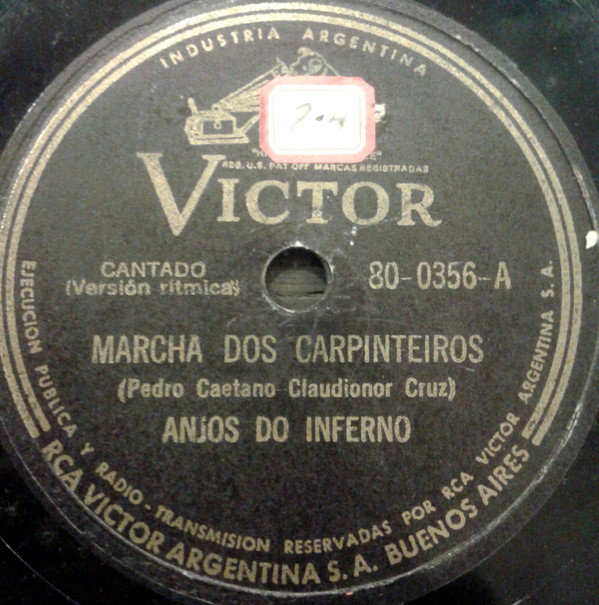MusiQ
Anjos Do Inferno - Marcha Dos Carpinteiros Oba Oba
Table of Contents
Download
Filename: anjos-do-inferno-marcha-dos-carpinteiros-oba-oba.rar- MP3 size: 7.2 mb
- FLAC size: 114 mb
Tracks
| Track | Duration | Preview |
|---|---|---|
| Oba, Oba | ||
| Marcha Dos Carpinteiros |
Images


Catalog Numbers
80-0356Labels
VictorListen online
- online luisteren
- lytte på nettet
- online anhören
- lyssna på nätet
- ascolta in linea
- ouvir online
- escuchar en línea
- écouter en ligne
- kuunnella verkossa
Formats
- Shellac
- 10"
- 78 RPM
About Anjos Do Inferno
The most famous vocal and instrumental group of the Golden Era of Brazilian song, the Anjos do Inferno were insuperable in their 20-year international career, in terms of rhythm, humor, and bossa. The group was founded in 1934 by singer Oto Alves Borges with the following members: Oto Borges (crooner), Antônio Barbosa (pandeiro), Moacir Bittencourt (violão), Felipe Brasil (violão), José Barbosa (violão tenor), and Milton Campos ("nasal trumpet," the first musician to dedicate himself to that in Brazil). The group opened at Rádio Cajuti and Cruzeiro do Sul, recording for the first time for Columbia ("Morena Complicada" by Kid Pepe, and "Amei Demais" by Kid Pepe and Siqueira Filho), but having no major impact. Returning from a U.S. tour in 1936, singer Leo Vilar assumed the group's direction while Oto Borges dedicated himself exclusively to his activities at the Banco do Brasil. Soon the group was hired for the Cassino Icaraí, where they achieved success. The next recording, still in 1936, was Kid Pepe's "Maria Foi à Fonte." In the same year the Anjos became part of the cast of the Rádio Mayrink Veiga, where they continued until 1938. In that year, Leo Vilar fired the brothers Antônio and José Barbosa, replacing them with Alberto Paes (pandeiro) and Aluísio Ferreira (violão tenor), and substituting Milton Campos for Harry Vasco de Almeida in the "nasal trumpet" position. With that formation the group opened at Rádio Tupi, where they would remain until 1946, performed at the Cassino da Urca, and recorded for Columbia the first album of that phase, with Almanir Grego's march "Tim Tim por Tim Tim" and Alberto Paes/Domício Augusto's samba "Dura Lex sed Lex." But the first hit came with the samba-canção "Bahia, oi, Bahia" (Vicente Paiva/Augusto Mequita). With the success they became Columbia's exclusive artists, and after that they piled hit over hit, including the rumba "Barraco Abandonado" (Afonso Scola/Hermínio Viana), the samba-jongo "Me Ensina a Sambar" (Antônio Almeida), the samba "Baiana Boa" (Milton Bittencourt), the samba "Quem Dirá?" (Pandiá Pires/), the samba "Helena! Helena!" (Antônio Almeida/Secundino Silva), the march "Cowboy do Amor" (/), the march "Todo Mundo Dança" (Valdemar Silva/), the samba "Me Deixa Viver" (Bide/Marçal), the march "Quebra Tudo" (João de Barro/), and the march "Três Marias" (Cristóvão de Alencar/Frazão). They had several other hits, including the second and last samba recorded by the group, "Já que Está Deixa Ficar," and their biggest one, the samba "Você já Foi à Bahia?."
In 1942 the group went through changes, with Hélio Verri replacing Alberto Paes at the pandeiro, Roberto "Paciência" Medeiros taking Moacir Bittencourt's place, and Walther Pinheiro substituting Felipe Brasil. Renato Batista ('s brother) replaced Walther Pinheiro for a short while, and when the latter returned to the group it became a septet for some months. Pinheiro is present in the recording of the sambas "Vatapá" and "Rosa Morena." In the next year the group switched to Columbia, where they recorded the hits "Acontece que eu sou Baiano" and "Vestido de Bolero." In 1944 they were hired by RCA Victor, where they remained until 1952. There they recorded, among many albums, the samba "Que Gostinho Bom" (/Mário Rossi), the samba "Bolinha de Papel" (), the samba "Diz que Sim, Diz que Não" (), and the march "Cordão dos Puxa-sacos" (Frazão/). In 1944 they performed in the film Abacaxi Azul. In 1946 they toured through Argentina and Mexico, with José Soares (the Russinho) replacing Hélio Verri. In February 1947 they opened in the biggest Latin American nightclub of those times, El Pateo, in Mexico City. They had been hired for six weeks, but stayed for four years. From Mexico, in 1948, several members emigrated to the U.S. joining the Bando da Lua: Harry Vasco de Almeida, Aluísio Ferreira, Walther Pinheiro, and Russinho. Vilar called other musicians from Brazil to replace them, former members of the Os Namorados: Nanai (violão), Miltinho (at the pandeiro then, he would become famous later as a singer), and Chicão (former Quitandinha Serenaders, violão tenor and tantã). In the new formation, the group toured U.S., performed in Los Angeles together with , and kept for two years a radio program about aspects of Brazil. In Mexico, the Anjos do Inferno participated in 11 films, eight of them featuring Ninón Sevilla, a big star then.
In 1951 they returned to Brazil after a tour through Chile and Argentina, hired for the anniversary of Recife's Rádio Jornal do Comércio. The group also came back to Rádio Tupi, spent a season at the Monte Carlo nightclub, and, in São Paulo, performed at Rádio Excelsior and the Oasis nightclub. In 1953 the Anjos had a season at Rio's Rádio Nacional. But the successful tours were troubled by an increase in the price of plane tickets, and, finally, Leo Vilar was forced to dissolve the group. In 1959, especially for , J. Maia, and José Mauro's play De Cabral a JK, Vilar organized a group under the denomination Anjos do Inferno, with he himself as crooner and percussionist, as well as Gaúcho (violão), Paulo César (tantã), and Miguel Ângelo (pandeiro). They also worked as actors in the play, which had a six-month season. This formation recorded some minor albums through Copacabana. In 1967, Walter Pinheiro, Aluísio Ferreira, Roberto Medeiros, Harry Vasco de Almeida, and Russinho got together to play on Mondays at the Arena Clube de Arte in Rio, where they told stories and remembered the old times.
Name Vars
- Anjos De Inferno
- Los Angeles Del Infierno
- Os Anjos Do Inferno
Members
- Lu Lu Ferreira
- Miltinho
- Nanái
- Walter Pinheiro
- Russinho Do Pandeiro
- Harry Vasco De Almeida
